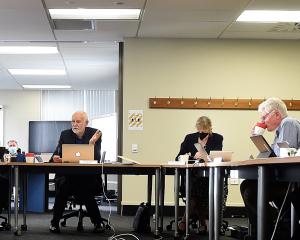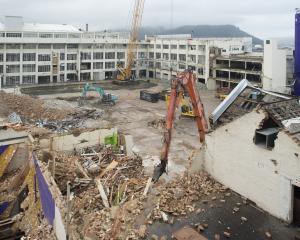The Ministry of Health has confirmed the Southern District Health Board will remain the national provider of a specialised radiation procedure, while a Dunedin Hospital senior doctor says it is only a matter of time before the service cannot cope with demand.
Partly prompted by a private Auckland provider setting up stereotactic radiosurgery, the ministry ordered a review of the procedure, which uses highly targeted radiation for some types of brain tumour and vascular malformations.
The ministry confirmed this week the SDHB would remain the only public provider, dealing with about 80 patients a year.
But it also said changing technology, and new indications, meant radiosurgery would likely be offered by other centres in future.
The national provider status strengthens Dunedin's claim for three neurosurgeons, because the procedure requires the input of neurosurgery, as well as radiation oncology.
The ministry rejected some of the recommendations of a lengthy report commissioned from an expert reference group, which said the service needed to change to cope with increased demand.
"Since 1994, a national stereotactic radiosurgery service has been delivered from the Dunedin-based facility. This reflected the economic and technical demands of the service at that time. However, times are changing," the report said.
"To support this development and to oversee referral and funding arrangements, this service should ideally be governed by a body that reflects the professional and geographic diversity of its stakeholders."
Benchmarked against a service in Plymouth, England, New Zealand could increase procedure volume by 150%, the report said.
One of the key factors is a trend towards using radiosurgery for metastatic brain tumours.
ICancer programme national clinical director Dr John Childs said in a statement the ministry did not agree with all aspects of the report.
Further work was needed on the "cost-effectiveness" of radiosurgery for metastatic brain tumours.
"We need to better understand the number of people in New Zealand with cerebral metastases who might benefit from this treatment.
"There are a range of options for the treatment of cerebral metastases and advances in technology mean this treatment may be an option for more people in the future."
Technology and clinical practice changes made it likely radiosurgery would be offered in other centres in future, the statement said.
SDHB radiation oncology clinical leader Dr John North said he expected other centres to start offering radiosurgery in the next couple of years.
He also expected a drop-off in demand soon, because northern DHBs could buy the private Auckland provider's new radiosurgery service.
Dunedin could not increase capacity, as its radiation oncologists were already stretched, and there were two long-standing vacancies in the unit, he said.
There was a trend worldwide towards using radiosurgery for metastatic brain tumours, he said.
Dunedin was likely to remain the provider for complex cases, because of its extensive experience, he said.
South Island neurosurgical service manager Joy Farley said the ministry's decision was good for Dunedin neurosurgery, but she would keep a "watching brief" on the situation.
Advertisement













